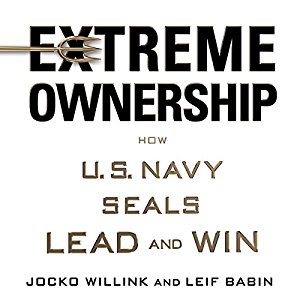Leadership | Key Insight 1: Extreme Ownership
Dear All
In this post, I will reflect on the first key insight of the book by Jocko Willink "Extreme Ownership - How US. Navy seals fight and Win*"

I am a HR director in a respected firm and as such I am witnessing good, bad and ugly leadership every day. This post will be primarily a theoretical reflection of the topic and the first post of three. In each I will address a key question challenging Jockos first Insight.
Jocko says that successful Leadership at the end of the day is getting the job done. whether the mission is a success or failure is the true measurement of a leader. This was a very challenging perspective for me to accept at first,
• What if the mission was impossible to begin with?
• What if someone has done everything in their power?
• What if it wasn’t the leaders fault that something went wrong?
Let’s address the first question
• What if the mission was impossible to begin with?
The wisest reply I have heard to this point is to first acknowledge the rigid worldview underlying the question. The question assumes absolutes such as possible or impossible. This can provide a serie of problems. The first set of problems emerge when a person gives up before even trying because they deem a task “impossible”. In the other case, the respect for obstacles gets depreciated if “everything is possible”. For now I will present an alternative perspective that I believe is more helpful. By assessing goals in terms of their difficulty enables a more non-judgemental and constructive approach to the goal.
Let me present an arbitrary example, Instead of deeming a task impossible i.e. Loosing 100 pounds in 1 day, the new approach would consider the task in terms of the difficulty of doing so. In this case the obstacles i.e laws of physics and limited technology would make the task beyond extremely difficult. Its not impossible per se, who knows whether the technology in 30 or 50 years could enable this? On the other hand, instead of saying “off course everything is possible – mind over matter”, The same analysis can lead to a discussion about the actual challenges and the solutions to these. Furthermore, in the process of assessing difficulty, The team gets the chance to learn from each other by sharing their assessment of the difficulty level as each contributing member has different skills and experience which makes them see the difficulty level differently.
A potential action point: When someone in your office states an absolute like “that’s impossible” or “everything is possible”, Take time to ask them the question: “What makes the impossible so difficult?” or “what challenges needs to be solved to make the possible happen?” That way your team will be more constructive and get rid of rigid absolutes.
That’s my 5 cents, hope we can get a good discussion going :-)
A question to consider: What if we instead of analyzing difficulty analyzed the easiness, could that empower the team?
Sincerely
Mikk N
*I have zero affiliation with Jocko so the promotion is merely out of true appreciation for the book.